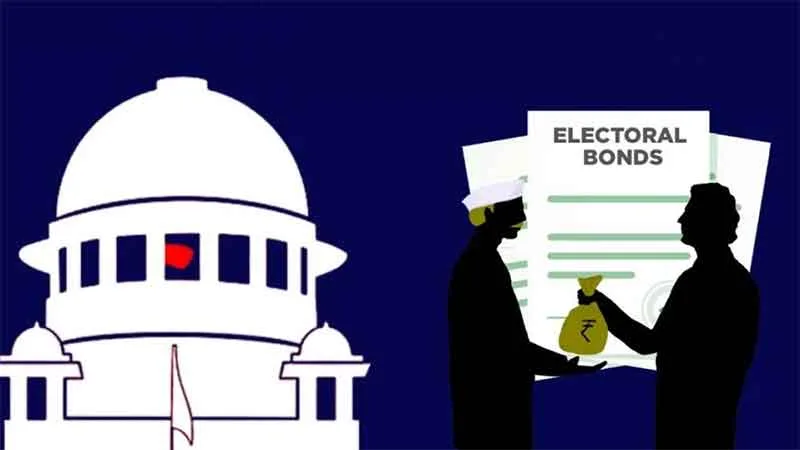
In recent days the political scene in India has been full of discussion on big-time donations to political parties, particularly by corporate interests, and the strong stand taken on this by the Supreme Court of India for transparency relating to these. In recent years most of these donations had been taking place through a system of electoral bonds. A total of 22, 217 such bonds were sold since 2019, 90% 0f them valued at INR 10 million (10 million= one crore) each.
While this scheme of electoral bonds was launched in the name of introducing transparency in political donations, in fact this established a very strong system of non-transparency! I remember that when a big campaign had been launched in India for passing strong Right to Information (RTI) law, transparency not just in donations to political parties but also in their overall functioning was being discussed among many campaigners. People were therefore very upset by the new system of electoral bonds and there was widespread suspicion that these may be used by the super-rich, big corporate entities or their shell companies to gain favor with ruling political parties, resulting in policies and decisions favorable to them, often at the cost of public interest.
There had been frequent demands from time to time to either abolish or to substantially reform this highly objectionable system, but nothing effective was done till early this year when in February the Supreme Court ordered the abolition of this system, meaning that no new electoral bonds would be issued, and in addition also directed that a system of transparency has to be created regarding the electoral bonds already purchased earlier for making donations to political parties.
Such a system of transparency is needed not only in the context of the now-abolished electoral bonds, but also in the context of any other system of funding for political parties that may emerge. The stand taken by the government that the people do not have the right to know about donors or other aspects of financing of political parties violates the right to information and other important democratic rights and principles too.
Hence while the principle of transparency with respect to donations to political parties is very well-established, it is important to point out at the same time that our concerns do not stop merely at achieving transparency in this important context. The ultimate aim is a much wider one of curbing in a big way and minimizing, if not eliminating, the baneful impact of huge donations given by billionaires, the super-rich and big corporate entities to political parties, in return of which there is an implicit if not explicit understanding that they will be able to get benefits much bigger than what they are donating or rather ‘investing’.
Of course transparency is a very important first step for moving in this direction of curbing the influence of big money in the political system of any country, but it is important to remember that it is only a first step, even though a very important one. Much more remains to be done beyond transparency to achieve success in actually reducing the baneful impact of big business money in the political systems of any country.
In some countries such transparency is actually in place in the sense that many details regarding who gives and who receives political donations are available in the public domain. However this has not prevented the very harmful impact of donations by big business interests on government decisions.
Perhaps the most shocking example of this relates to the military-industrial complex in the USA and its impact on political decisions. The military industrial complex, having thousands of military contractors and weapon producing companies but increasingly dominated by a handful of giants arms companies, has developed such close contacts with the political establishment that the entire set-up in the USA is often referred to as military-industrial congressional complex.
The military contractors and weapon companies in the private sector get over half of the Pentagon budget, or over 400 billion dollars, in the form of contracts or supply orders. It is easy for them therefore to routinely give millions of dollars to election or re-election campaigns or other expenses of political leaders. In addition the military contractors and weapon companies give even more to those lobbyists who work for a similar aim of keep increasing the military budget resulting in more and more orders. For the same objective of raising shrill voices to increase defense and military budgets several think-tanks are regularly funded too. All this in turn ensures that the rising military budget keeps resulting in high orders for the biggest military contractors and big weapon companies in particular, giving them a lucrative return on the political ‘investment’ they make so happily.
In this context it is useful to refer to an article in ‘Public Citizen’ (July 7, 2022) written by Savannah Wooten and Rick Claypool. This has a tell-tale title—‘Military Industrial Complex Clinches 4,50,000% return on investment’. As this article goes on to explain, “after industry gives $10 million to Congressional Defense Committee members, Department of Defense receives potential $45 billion spending increase”. This article goes on to name over 60 members of House and Senate Armed Services Committees who received contributions (campaign committee and leadership of PAC contributions combined) from the military industry worth 10 million dollars in 2022. The exact amount received is also mentioned, exceeding 8 hundred thousand dollars for a single political leader at the top of the ladder, and lesser amounts for others.
So here is an example of a system in which transparency already exists in the sense of details of ‘contributions’ being mostly all available, but at the same time, despite the transparency, the highly harmful system continues to function in ways which greatly increase the arms race and the excessive expenditure on weapons. The USA has a military budget which exceeds the budget of the ten next largest military spender countries, and yet it is constantly under pressure to increase further. Several analysts have argued that the relentless manipulative pressures of the military industrial complex has increased the possibilities of USA’s never-ending wars.
Keeping in view these wider factors it is important to emphasize that while transparency is important as an important first step, the goal must be a wider one of actually reducing to a very significant extent the very harmful role of big business donations for political parties and politicians.
Bharat Dogra is Honorary Convener, Campaign to Save Earth Now. His recent books include Planet in Peril, Protecting Earth for Children, Man over Machine and A Day in 2071.











































